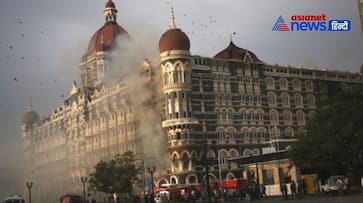Saroj Kumar Rath, a professor at the Delhi University and author of “Fragile Frontiers: The Secret History of Mumbai Terror attacks,” said that there were many people back then who had tried to paint a very different image of the 26/11 attack
The events around the Mumbai 26/11 attack were raked up following the revelations made by lead investigator and former Mumbai police commissioner Rakesh Maria.
Maria, who led the probe into the attack in his book, “Let Me Say it Now”, spoke about how attempts were made to pass of the entire attack as a doing of the Hindus. He also said that had Ajmal Kasab not been caught, then he would have lived as Samir Choudhary.
Saroj Kumar Rath, a professor at the Delhi University and author of “Fragile Frontiers: The Secret History of Mumbai Terror attacks,” said that there were many people back then who had tried to paint a very different image of the attack. In this interview with MyNation, Rath said that such statements only ensured that we were playing into the hands of Pakistan, who too were driving a similar narrative.
What are your thoughts on Rakesh Maria’s claim?
It was a well known fact that Kasab was given an identification card in which his name is mentioned as a Hindu. However, what I think is that this would not have made much of a difference, as it was crystal clear that he had come from Pakistan.
What about the narrative by the likes of Digvijaya Singh, AR Antulay and the rest?
They tried to portray it as Hindu terror. The question is how were they planning on substantiating that. The Congress was in a dilemma. These persons are known for their rhetoric. Even after Pakistan admitted to the attack, their persons continued to blame the Hindus.
Doesn’t this compromise our war on terror?
When the 9/11 attack happened, there was an attempt to blame the Jews. However, in the US, there was no question of a compromise. The response was so strong that there was no repetition of such acts. I agree such statements that were made in the aftermath of the 26/11 attack compromised our war against terror.
Was a consensus lacking?
In the US, there was a consensus post 9/11. The enemy had been identified and the nation was firm. However, here we had statements from leaders of leading political parties. There is a democracy and the intent has been to appease.
Are we playing into the hands of Pakistan?
I was part of a parliamentary panel, which visited the Dhauj village in Haryana. Parliamentarians from Pakistan, Bangladesh and Sri Lanka were part of this panel. This had happened before the 26/11 attack. At the village, the question that the Pakistani parliamentarian asked was whether Muslims were allowed to offer namaz. The answer they got was who will prevent them. See the mindset, the Pakistanis are so prejudiced to such an extent that they believe that the Indian Muslims are suffering. This is the kind of false narrative that they spread.
Why do the likes of Digvijaya Singh, Mahesh Bhatt make such statements?
These persons are not concerned about the issue. They will keep talking about such issues. Basically they are playing into the hands of a narrative that Pakistan has been trying to set. Even in Pulwama, there were various rumours that were being spread. This makes Pakistan’s case easy and they even speak about the statements made by our leaders in their Parliament. Ultimately, the investigation suffers.
What about the response of the government post 26/11?
Post 26/11, no action was taken. Pakistan was under a lot of pressure. We lacked political leadership. The kind of soul searching that happened post 9/11 should have happened here as well. Restricting future attacks is the key. Yes, India did create several agencies, but what is the efficacy?
The IAF said it was ready post 26/11 to hit Pakistan
The forces are not the decision makers. Our forces are ready 24/7 and they can react in a fraction of a second. There was lack of instruction from the political leadership. Even after India carried out the surgical strikes, the former NSA, M K Narayanan had said that they too had options available back then, but did not take it. Such strikes need guts. India was thinking of the reaction from the West and also the possibility of a war if we hit.
Your thoughts on the Balakot air strike?
Balakot conveyed a very strong message. That is I will hit if you trouble me. Such strikes put us at a psychological advantage. If we don’t hit, they will keep hitting. We sent a message to Pakistan that we will punish them. The message was clear and that is, do not mess with us.
Post 26/11, Pakistan was under immense pressure. We had the clear mandate and international support. We could have taken a firm decision on Pakistan. Post Pulwama, the US said we have the right to defend ourselves and we did go ahead and send a very strong message to Pakistan.
What about abrogation of Article 370?
The abrogation of Article 370 was a very bold statement. It should have been done a long time back. It was the vested interests that prevented this decision from being taken. This was long due.
Last Updated Feb 20, 2020, 12:33 PM IST









![Salman Khan sets stage on fire for Anant Ambani, Radhika Merchant pre-wedding festivities [WATCH] ATG](https://static-gi.asianetnews.com/images/01hr1hh8y86gvb4kbqgnyhc0w0/whatsapp-image-2024-03-03-at-12-24-37-pm_100x60xt.jpg)
![Pregnant Deepika Padukone dances with Ranveer Singh at Anant Ambani, Radhika Merchant pre-wedding bash [WATCH] ATG](https://static-gi.asianetnews.com/images/01hr1ffyd3nzqzgm6ba0k87vr8/whatsapp-image-2024-03-03-at-11-45-35-am_100x60xt.jpg)


